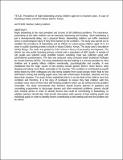Prevalence of night bedwetting among children aged ten to fourteen years. A case of boarding primary schools in Maara district- Kenya

View/
Date
2012-04Author
Muthuri, Mercy Kathoni
Type
ThesisLanguage
enMetadata
Show full item recordAbstract
Night bedwetting is the most prevalent and chronic of all childhood problems. The experience, particularly of the older children can be extremely distressing and limiting. Most bedwetting is just a developmental delay, not a physical illness. Bedwetting children can suffer emotional stress or psychological injury if they feel shamed by the condition. The study was carried out to establish the prevalence of bedwetting and its effects on school going children aged 10 to 14 years in public boarding primary schools in Maara District, Kenya. The study used a descriptive survey design. The study was guided by Erik Erikson’s theory of personality development. The district has nine public boarding primary schools with a population of 3067 pupils. A sample of 341 pupils was selected using stratified random sampling. Data was collected using self-administered questionnaires. The data was analyzed using computer-based Statistical Packages for Social Sciences (SPSS). The study established that bed wetting is a common problem to most children and it greatly affects children emotionally, psychologically and socially. It was established that the major causes of bed wetting include genetic factors, stress factors, deep sleeping and taking much fluid, especially in the evening. This condition is contributed by pupils being teased by other colleagues and also being isolated from social groups which lead to low self-esteem among bed wetting pupils since they felt embarrassed, frustrated, ashamed and shy about their situation. The study further established that it is not the fault of the child to have this condition and therefore, it is the duty of caretakers to ensure they help children with this condition since most of them have self-limiting problems which can be solved and this problem controlled. The study recommends that: teachers should involve learners in guidance and counseling programmes to discourage shyness and other emotional problems; parents should seek medical advice in order to identify factors that could be contributing to bedwetting. In addition teachers should also hold private discussions with parents of bed wetting pupils and individual pupils in order to identify factors contributing to bed wetting and how the problem can be solved.
Publisher
KeMU
Subject
Night bedwetingDescription
RJ 476.K3 2012
